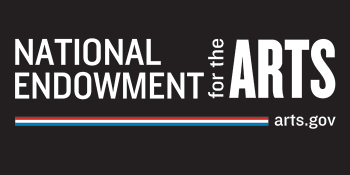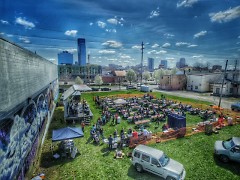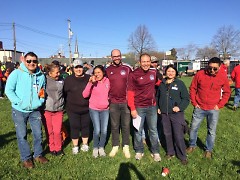On Saturday, April 23, neighbors on the westside of Grand Rapids got “down and dirty” at the annual Westside Community Cleanup. Started in 2009, it has evolved from a small group of concerned residents who saw a need to clean up the neighborhood into much more; an intentional placemaking effort to build an inclusive Westside community.
The near westside is one of Grand Rapids’ most representative neighborhoods. But like many other neighborhoods in Grand Rapids, development is changing dynamics rapidly. New construction and business investment is altering the look and feel of the neighborhood.
As people of all ages and backgrounds ate together at the cleanup’s after-party, there were visible elements of the “new Westside.” No one minded the free craft beer donated by Harmony Hall. And on the opposite side, steel beams protruded the skyline where another craft brewery will go, along with the first sushi place ever to exist on the Westside. The event itself was hosted on the property of a local development titan behind much of Grand Rapids’ redevelopment, Rockford Construction. Behind the event stage, a mural on the back of their building portrays three women-White, Black, and Latina, and a banner with the words: Knowledge, Community, Nature.
This year’s event was planned by the WestSide Collaborative, whose mission is to see a “diverse Westside marked by inclusion, equity and hope.” And if you looked around, the event was symbolic of what might be in store for the Westside, where everyone feels like they belong, has a voice and is not only part of the transformation, but benefits directly. Especially those who have historically been excluded and who often are the victims of change: low-income families and people of color.
The Westside is full of hope these days. Last Wednesday, April 27, the Grand Rapids Community Foundation announced the expansion of Challenge Scholars, an initiative that seeks to increase the number of low-income, first generation students completing college by offering them a scholarship that will make college tuition-free. The program has been around for three years, promising a four year tuition-free path to 6th graders at two Westside schools, Harrison Park and Westwood. But the expansion makes it so all students in the incoming class of 2020 at Union High School will have at least a two year tuition-free option at Grand Rapids Community College. With Union’s enrollment at over 1,000 students, that is big news. It is expected that in a few years, many more students will have a pathway out of poverty through college or career training.
Then the next day, the Westside schools inducted the newest class of Challenge Scholars students, current 6th graders at Harrison Park and Westwood who are on the path to four years of tuition-free college if they meet the grade, attendance and behavior requirements and graduate from Union High School. Like the cleanup, the event evoked a spirit of unity and aimed to send a message of hope to students on the Westside: “The community is behind you, it believes in you, it needs you to be a part of the change.” An aura of promise hung over the room as community members, school staff, and parents’ voices echoed, “You’ve got this!”
But what is the actual hope here, is it the promise of free college? My work with Challenge Scholars for the last three years has confirmed what we already knew: the promise of free college doesn’t guarantee success. It won’t magically raise grades and fix all of the barriers that have kept people of color from being successful to begin with. As a community, we must move beyond heartwarming events into the collaborative designs that address these inequities. To address one inequity, you must address them all.
We address the systemic inequities by giving people who have been marginalized the tools to make a difference. It’s one thing to promise free college to children, but if parents who have not been to college, or even graduated high school, are not given the tools to support their child’s academics at school and at home, how can we expect them to successfully navigate their children’s path to college? If parents can’t find quality jobs that pay livable wages with benefits, how can we expect them to adequately feed their children and keep the lights on? If rising housing prices and scarcity make it impossible to find safe, healthy and affordable housing, how can we hope to make good on the promise of free college? We fail the child in all the ways we fail the parent.
The true power of Challenge Scholars was evidenced by a parent who spoke at the expansion announcement about how Challenge Scholars inspired her to pursue her own career training and become a pharmacy technician. She wanted to set an example to her children.
The true power is the community coming together to intervene on behalf of that same parent to help her find an affordable place to live and remain on the Westside and in the Challenge Scholars program. Her landlord was willing to see the value of keeping her family in the neighborhood over the prospect of higher rents to college students.
The true power is in moving beyond the enormous investment this community has made to make college affordable for these students, and commit to figuring out all of the other pieces necessary to make good on that investment.
This means continuing to build stronger communities and inclusive growth. It means not just helping to pay for college, but working with local businesses to hire these same parents and students from the neighborhood. It means helping some start new businesses, or own a home so they no longer have to fear displacement. It means investing in building the parent’s capacity to support their child, because they are our children, the community’s children, too.
It is about recognizing that the parents have done, are doing and will continue to do their part, as best they can, and we in the broader community saying, “Let us do our part, let us help fix what we have broken.” It means promising that the rising tide of investment and capital in our neighborhoods will indeed raise all ships, and won’t crash down on our most vulnerable like a tsunami.
As I rode an Uber to one of the schools, my Uber driver and I got to talking about Challenge Scholars. I told him about my work with families and leaders in the community, and the promise and hope that awaits the students and their families. “These people don’t deserve that,” he said. “They don’t care.” He isn’t the first to make comments like this, and I know who he means by “these people.”
Tell that to the Latina mother who was crouched down on all fours during the cleanup, clearing a stormwater drain on a street she doesn’t live on, as she said to me in Spanish, “We have to clean this, this is what causes flooding...and this trash, this is what goes in our water.” She brought her kids to help at the cleanup, some of which are Challenge Scholars, because “They need to learn to care for their neighborhood and environment.”
I hear often about the brain drain in Grand Rapids, and the lack of diversity, particularly in our skilled workforce. Some employers await eagerly for our Challenge Scholars to graduate and fill our talent gap and so do I. They have enormous potential.
During this season of bountiful rain, I keep thinking about that mother hunched over the clogged stormwater drain. Like her, we have to intentionally remove the gunk that has settled over many winters, the trash that has collected, keeping our opportunities from flowing freely.
But it’s going to take a heck of a lot more than free college. It’s going to take a community who is willing to reinvent itself, to take ownership and address all of the interconnected, historical and generational inequities. Maybe if we can figure it out on the Westside, we can figure it out for other parts of Grand Rapids, too.
The Rapidian, a program of the 501(c)3 nonprofit Community Media Center, relies on the community’s support to help cover the cost of training reporters and publishing content.
We need your help.
If each of our readers and content creators who values this community platform help support its creation and maintenance, The Rapidian can continue to educate and facilitate a conversation around issues for years to come.
Please support The Rapidian and make a contribution today.



